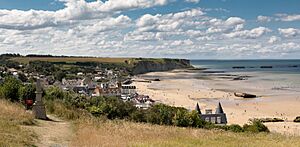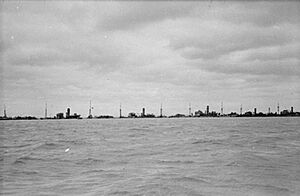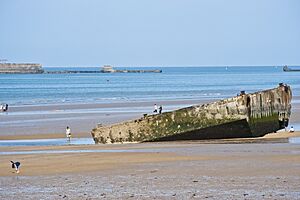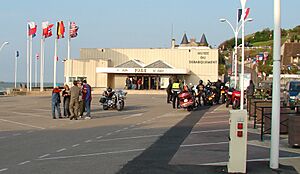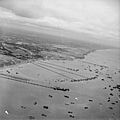Arromanches-les-Bains facts for kids
Quick facts for kids
Arromanches-les-Bains
|
||
|---|---|---|
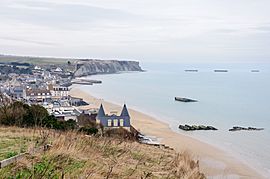
Arromanches, with the remains of the Mulberry harbour in its bay
|
||
|
||
| Country | France | |
| Region | Normandy | |
| Department | Calvados | |
| Arrondissement | Bayeux | |
| Canton | Courseulles-sur-Mer | |
| Intercommunality | Bessin, Seulles et Mer | |
| Area
1
|
13.7 km2 (5.3 sq mi) | |
| Population
(2010)
|
587 | |
| • Density | 42.85/km2 (111.0/sq mi) | |
| Time zone | UTC+01:00 (CET) | |
| • Summer (DST) | UTC+02:00 (CEST) | |
| INSEE/Postal code |
14021 /14117
|
|
| Elevation | 0–55 m (0–180 ft) (avg. 15 m or 49 ft) |
|
| 1 French Land Register data, which excludes lakes, ponds, glaciers > 1 km2 (0.386 sq mi or 247 acres) and river estuaries. | ||
Arromanches-les-Bains is a small town in France. It is located in the Calvados department, which is part of the Normandy region in the northwest of the country. This charming seaside place is famous for its important role in World War II.
Contents
Discover Arromanches-les-Bains
Arromanches-les-Bains is a commune, which is like a small local government area in France. It is a popular spot for tourists, especially those interested in history. The town is known for its beautiful beaches and cliffs along the coast.
Location and Landscape
Arromanches is right on the coast of the English Channel. It is surrounded by green hills and has lovely sandy beaches. The town is quite small, with about 587 people living there as of 2010.
History of Arromanches
Arromanches has a long history, but it is most famous for an amazing event during World War II. On D-Day, June 6, 1944, Allied forces landed on the beaches of Normandy. Arromanches was a key location for this huge operation.
The Mulberry Harbour
After the D-Day landings, the Allies needed a way to bring lots of supplies and equipment to France. They couldn't capture a big port quickly enough. So, they decided to build their own temporary harbours! These were called Mulberry Harbours.
Arromanches was chosen as the site for one of these incredible artificial ports, named Port Winston. This harbour was built using huge concrete blocks and floating roadways. These parts were made in Britain and then towed across the English Channel.
How the Harbour Worked
The Mulberry Harbour allowed thousands of tons of supplies to be brought ashore every day. This included tanks, vehicles, food, and ammunition. It was a vital part of the D-Day invasion's success. Without it, the Allied armies might not have been able to push forward.
Even today, you can still see the remains of the Mulberry Harbour in the bay of Arromanches. These concrete blocks stand as a powerful reminder of this incredible engineering feat. They show how people worked together to overcome huge challenges during the war.
Arromanches Today
Today, Arromanches-les-Bains is a peaceful town. It welcomes many visitors who come to learn about its history and enjoy the coast.
Museums and Memorials
The town has a special museum called the Musée du Débarquement (Museum of the Landings). This museum tells the story of the D-Day landings and the Mulberry Harbour. It has models, films, and real objects from that time.
There are also memorials around the town. These remember the soldiers who fought and sacrificed during the war. Visiting these places helps people understand the importance of peace.
Things to See
Besides the museum and the harbour remains, you can also see:
- The old town hall.
- The Church of Saint Peter.
- Beautiful views from the cliffs.
- A "whale pier" bridge element from the Mulberry harbour on display.
Arromanches is a place where history comes alive. It is a great spot to learn about a very important time in world history.
Images for kids
-
The Lavoir (public laundry)
-
Winston Churchill at Arromanches 21–23 July 1944
See also
 In Spanish: Arromanches-les-Bains para niños
In Spanish: Arromanches-les-Bains para niños
 | Jackie Robinson |
 | Jack Johnson |
 | Althea Gibson |
 | Arthur Ashe |
 | Muhammad Ali |





